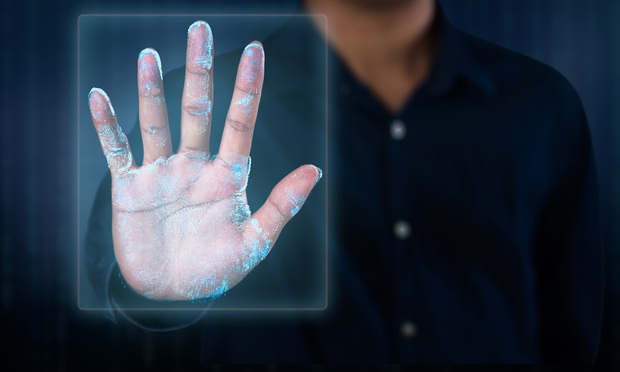Bumpy Ride for Six Flags: Biometrics Tactics Ruled Illegal in Illinois
In reversing a lower appellate court ruling, the Illinois Supreme Court found that Six Flags' fingerprint tactics for park guests violates the state's biometrics law.
January 25, 2019 at 06:24 PM
3 minute read
The original version of this story was published on Legal Tech News

The Illinois Supreme Court has ruled that under the state's biometrics law, plaintiffs don't need to show actual injury in order to recover damages.
On Jan. 25, the Illinois Supreme Court agreed that a 14-year-old boy's rights were violated under the Biometric Information Privacy Act when a Gurnee, Illinois, Six Flags collected and stored his fingerprint for repeat-entry access into the park without issuing prior required notice and release.
Illinois' Biometric Privacy Information Act was enacted in 2008 and requires private entities, in part, to give written notice regarding when and what biometric information is collected or stored. Entities must also receive a written release from the person whose information is collected, according to the opinion.
In a Lake County, Illinois, circuit court, the boy's mother, who appeared on his behalf, sought damages and injunctive relief under the act and common-law action for unjust enrichment because the theme park never follow the law's protocol.
Defendant Six Flags Entertainment Corp., according to the state Supreme Court opinion, read the act as “evincing an intention by the Legislature to limit a plaintiff's right to bring a cause of action to circumstances where he or she has sustained some actual, damage, beyond violation of the rights conferred by the statue, as the result of the defendant's conduction.”
The circuit court denied the plaintiff's damages and injunctive relief motions. Later, the plaintiffs sought interlocutory review in the appellate court, asking if a person is aggrieved under the biometric law for statutory liquidated damages and injunctive relief when the only injury they allege is a violation of the act.
The appellate court ruled a plaintiff is only aggrieved and can pursue damages or injunctive relief under the act when it “must be more than a 'technical violation of the act,'” according to the state Supreme Court's opinion.
The state Supreme Court disagreed, writing that the appellate court's and defendants' reasoning added conditions and limitations the Legislature didn't express and interpreted the law inconsistently with the objectives of the statute .
“When a private entity fails to adhere to the statutory procedures, as defendants are alleged to have done here, 'the right of the individual to maintain [his or] her biometric privacy vanishes into thin air. The precise harm the Illinois legislature sought to prevent is then released.' This is no mere 'technicality.' The injury is real and significant,” the opinion said.
Actual injury or damage beyond violation of the action isn't needed, and would require disregarding the “commonly understood and accepted meaning of the term 'aggrieved,'” the state Supreme Court held.
This content has been archived. It is available through our partners, LexisNexis® and Bloomberg Law.
To view this content, please continue to their sites.
Not a Lexis Subscriber?
Subscribe Now
Not a Bloomberg Law Subscriber?
Subscribe Now
NOT FOR REPRINT
© 2025 ALM Global, LLC, All Rights Reserved. Request academic re-use from www.copyright.com. All other uses, submit a request to [email protected]. For more information visit Asset & Logo Licensing.
You Might Like
View All
Prof's Stinging Conclusion: Lawyers for Purdue Pharma Were 'Overzealous Accomplices in Corporate Misconduct'
6 minute read
'Blatant and Audacious': Sideman & Bancroft Wins Injunction for Biotech Startup Trilobio in Trade Secrets Theft Case

Sage Therapeutics Axes GC After Drug-Pipeline Failures Force Cost-Cutting
Trending Stories
- 1NJ Supreme Court Clarifies Affidavit of Merit Requirement for Doctor With Dual Specialties
- 2Whether to Choose State or Federal Court in a Case Involving a Franchise?
- 3Am Law 200 Firms Announce Wave of D.C. Hires in White-Collar, Antitrust, Litigation Practices
- 4K&L Gates Files String of Suits Against Electronics Manufacturer's Competitors, Brightness Misrepresentations
- 5'Better of the Split': District Judge Weighs Circuit Divide in Considering Who Pays Decades-Old Medical Bill
Who Got The Work
J. Brugh Lower of Gibbons has entered an appearance for industrial equipment supplier Devco Corporation in a pending trademark infringement lawsuit. The suit, accusing the defendant of selling knock-off Graco products, was filed Dec. 18 in New Jersey District Court by Rivkin Radler on behalf of Graco Inc. and Graco Minnesota. The case, assigned to U.S. District Judge Zahid N. Quraishi, is 3:24-cv-11294, Graco Inc. et al v. Devco Corporation.
Who Got The Work
Rebecca Maller-Stein and Kent A. Yalowitz of Arnold & Porter Kaye Scholer have entered their appearances for Hanaco Venture Capital and its executives, Lior Prosor and David Frankel, in a pending securities lawsuit. The action, filed on Dec. 24 in New York Southern District Court by Zell, Aron & Co. on behalf of Goldeneye Advisors, accuses the defendants of negligently and fraudulently managing the plaintiff's $1 million investment. The case, assigned to U.S. District Judge Vernon S. Broderick, is 1:24-cv-09918, Goldeneye Advisors, LLC v. Hanaco Venture Capital, Ltd. et al.
Who Got The Work
Attorneys from A&O Shearman has stepped in as defense counsel for Toronto-Dominion Bank and other defendants in a pending securities class action. The suit, filed Dec. 11 in New York Southern District Court by Bleichmar Fonti & Auld, accuses the defendants of concealing the bank's 'pervasive' deficiencies in regards to its compliance with the Bank Secrecy Act and the quality of its anti-money laundering controls. The case, assigned to U.S. District Judge Arun Subramanian, is 1:24-cv-09445, Gonzalez v. The Toronto-Dominion Bank et al.
Who Got The Work
Crown Castle International, a Pennsylvania company providing shared communications infrastructure, has turned to Luke D. Wolf of Gordon Rees Scully Mansukhani to fend off a pending breach-of-contract lawsuit. The court action, filed Nov. 25 in Michigan Eastern District Court by Hooper Hathaway PC on behalf of The Town Residences LLC, accuses Crown Castle of failing to transfer approximately $30,000 in utility payments from T-Mobile in breach of a roof-top lease and assignment agreement. The case, assigned to U.S. District Judge Susan K. Declercq, is 2:24-cv-13131, The Town Residences LLC v. T-Mobile US, Inc. et al.
Who Got The Work
Wilfred P. Coronato and Daniel M. Schwartz of McCarter & English have stepped in as defense counsel to Electrolux Home Products Inc. in a pending product liability lawsuit. The court action, filed Nov. 26 in New York Eastern District Court by Poulos Lopiccolo PC and Nagel Rice LLP on behalf of David Stern, alleges that the defendant's refrigerators’ drawers and shelving repeatedly break and fall apart within months after purchase. The case, assigned to U.S. District Judge Joan M. Azrack, is 2:24-cv-08204, Stern v. Electrolux Home Products, Inc.
Featured Firms
Law Offices of Gary Martin Hays & Associates, P.C.
(470) 294-1674
Law Offices of Mark E. Salomone
(857) 444-6468
Smith & Hassler
(713) 739-1250









